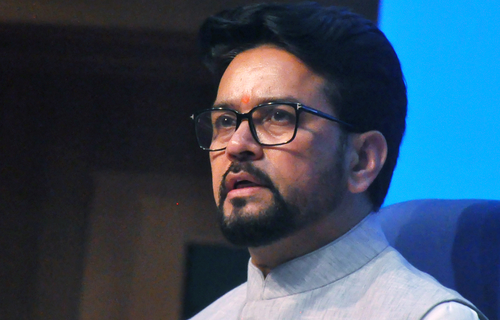[ad_1]
Bhubaneswar: With India basking in the glory of its success at the recently concluded 19th Asian Games at Hangzhou, Union Minister of Sports, Youth Affairs and Minister of Information and Broadcasting Anurag Singh Thakur attributed India’s success to its well-designed sports development policy that has managed to create a high-quality infrastructure and talent pool. The four-time Member of Parliament from the Lok Sabha and former Ranji player, who has earlier served as the president of the Himachal Pradesh Cricket Association for four straight terms, president of the Board of Control for Cricket in India (2015-2017) and went on to become the first serving MP from the BJP to become a regular commissioned officer in the Territorial Army, said India’s spectacular success in multi-sport event would not have been possible without the BJP-led government’s vision and support to budding players. In a freewheeling conversation with Sambad, Thakur shared the future of sporting activities in the country. Here is the excerpt:
Q: Indian atheletes have pulled off a grand performance at the 19th Asian Games and the government has played a pivotal role in it. What has been your experience?
A: We are extremely proud of India’s success. The supremely talented pool of atheletes we have today is due to the Centre’s TOP (Target Olympic Podium) scheme.
Q: A lot of Indian players in the Asian Games came from humble backgrounds. Should we direct our focus on rural areas for search of sporting talent?
A: Initiatives by the Sports and Youth Affairs Ministry like Khelo India University Games and Khelo India Youth Games have set a benchmark in creating a conducive platform for nurturing young talent who wish to carve out a career in sports.
Q: How instrumental, in your opinion, has Odisha government’s role been in the rise of hockey in India?
A: The role of Odisha in catapulting hockey into prominence is worth mentioning. However, we must move beyond focusing on Bhubaneswar, Cuttack and Rourkela as sport hubs and look towards cities like Berhampur, Sambalpur, Baripada, Jeypore, Koraput, Paradip, Nabarangpur, Bhawanipatna, Malkangiri, Keonjhar, Angul, Dhenkanal and Balangir to be included in the league.
Q: Do you think India’s success at the Asian Games will translate into a similar feat at the Paris Olympics next year?
A: Our success at the Asian Games is just the beginning. We are looking at a new turning point in our sporting history where the monopoly of cricket is giving way to the youth community harbouring similar interest in other sports as well. Neeraj Chopra’s role in inspiring fellow athelete Kishore Jena’s stellar performance in javelin is a befitting example in this regard. Our players will hopefully surpass their current achievements at the Paris Olympics and bring greater glories for the country.
Q: There’s a rising interest among youths to pursue career in sports, thanks to the Khelo India initiatives. Is there any policy in making to make India a sporting superpower?
A: There are provisions for facilitating overseas training and education for successful players in Khelo India Games. This helps give the youth a much needed boost in terms of support, requisite infrastructure and resources to pursue their passions.
Q: India has always earned medals in wrestling at the Olympics level. What could be the reason behind the disappointing performance of Indian wrestlers at the Asian Games this time?
A: The ongoing controversy and politics surrounding the Wrestling Federation of India and the protest of atheletes could have cast a shadow on their training, performance and morale. Sporting associations should not be managed by political leaders. This only results in loss of opportunities and the ecosystem of sports in the country. Also, professional players must refrain from involvement in strikes, demonstrations and protests.
Q: India is mulling to propose multi-city bid for the 2036 Olympics. To what extent is it a feasible reality?
A: This is a big dream for India which has been possible only due to the world-class infrastructure and much-needed fillip by the government. None of this would have been possible without Prime Minister Narendra Modi’s vision. To make India’s Olympic dream a reality, we need leaders like him.
[ad_2]

